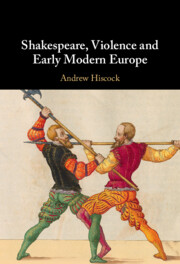Book contents
- Shakespeare, Violence and Early Modern Europe
- Shakespeare, Violence and Early Modern Europe
- Copyright page
- Dedication
- Contents
- Acknowledgements
- Notes on Sources and References
- Introduction
- Chapter 1 ‘touching violence or punishments’:
- Chapter 2 ‘Undoing all, as all had never been’:
- Chapter 3 In the Realm of the ‘unthankful King’: Violent Subjects and Subjectivities in the Henry IV Plays
- Chapter 4 ‘Now thrive the armourers’:
- Chapter 5 ‘the childe of his great Mistris favour, but the sonne of Bellona’: The Conflict-Ridden Careers of Robert Devereux, 2nd Earl of Essex
- Chapter 6 European Afterlives 1600–1770
- Conclusion
- Notes
- Select Bibliography
- Index
Chapter 2 - ‘Undoing all, as all had never been’:
The Play of Violence in Henry VI
Published online by Cambridge University Press: 10 February 2022
- Shakespeare, Violence and Early Modern Europe
- Shakespeare, Violence and Early Modern Europe
- Copyright page
- Dedication
- Contents
- Acknowledgements
- Notes on Sources and References
- Introduction
- Chapter 1 ‘touching violence or punishments’:
- Chapter 2 ‘Undoing all, as all had never been’:
- Chapter 3 In the Realm of the ‘unthankful King’: Violent Subjects and Subjectivities in the Henry IV Plays
- Chapter 4 ‘Now thrive the armourers’:
- Chapter 5 ‘the childe of his great Mistris favour, but the sonne of Bellona’: The Conflict-Ridden Careers of Robert Devereux, 2nd Earl of Essex
- Chapter 6 European Afterlives 1600–1770
- Conclusion
- Notes
- Select Bibliography
- Index
Summary
This chapter offers close readings of the Henry VI plays by Shakespeare (and his collaborators) in its exploration of a dramatic world convulsed by ‘incessant wars’. Late Elizabethan England remained thoroughly acquainted with the demands and traumas of resourcing multiple fields of conflict. Responding to the consuming debate surrounding militarism supported in late sixteenth-century publications and debate, these plays, written in the years directly following the defeat of the Armada, conjure up a tumultuous political landscape all too familiar to those attending the playhouse in the final decade of Elizabeth’s reign: the landscape of a nation beset by anxieties of suppressed religious and political identities as a consequence of unceasing military campaigns abroad, conspiracies at home, shifting allegiances of court factions and abiding questions surrounding the royal succession. Such texts spoke unflinchingly to the audience of what its world had been and what it might become again.
Keywords
- Type
- Chapter
- Information
- Shakespeare, Violence and Early Modern Europe , pp. 55 - 85Publisher: Cambridge University PressPrint publication year: 2022



